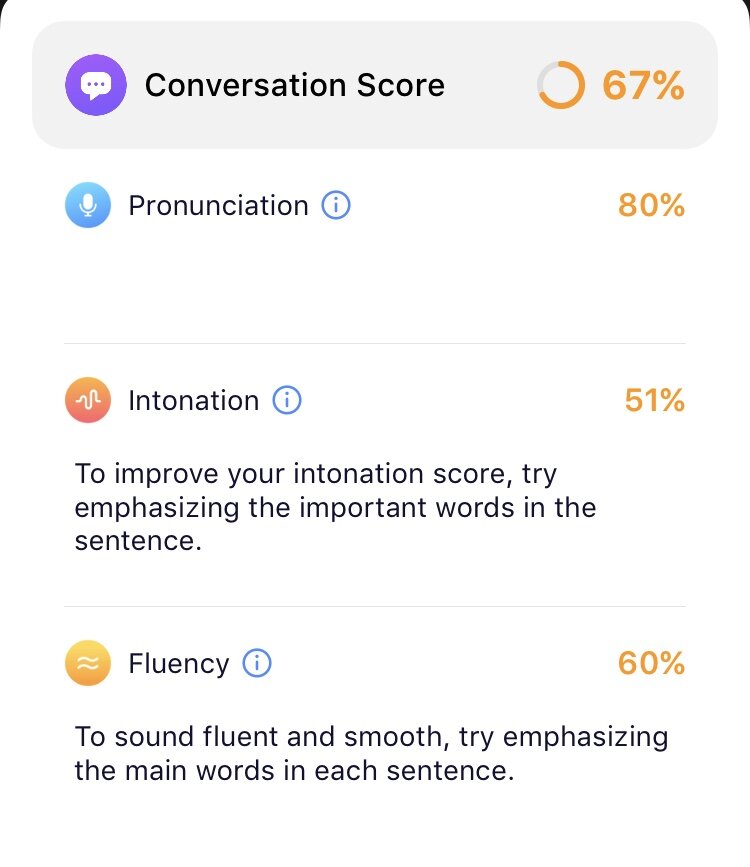How to Improve Your English Pronunciation in 7 Easy Steps
If you’ve spent more time learning English by reading or listening to audiobooks and videos than speaking, you may have a basic grasp of the words. But when it’s time to say them out loud, you struggle with the pronunciation.
By dedicating some of the time you spend on your English lessons to word pronunciation, you can get better. So, what are some things you can do to pronounce English words more easily?
Today, we’re going to look at these seven steps to help you improve your English pronunciation:
Simplify big words by breaking them down into syllables.
Learn when to stress words and sounds.
Choose one English accent, such as North American, and use it going forward.
Listen to English speakers on audio and talk along with them.
Record yourself to identify pronunciation weaknesses.
Read out loud every day to strengthen your jaw muscles.
Learn 24/7 with your virtual pronunciation coach Elsa.
Now, let’s get into the details of each step to help make pronouncing English words easier for you. If you incorporate these steps into your daily routine, your pronunciation will improve quickly, and you’ll speak English with more ease and clarity.
Imagine Speaking English Effortlessly!
Discover the world’s best way to improve your English speaking and pronunciation.
Sign up today and receive 80% off on a lifetime membership!
7 Steps to Better English Pronunciation
1. Break down big words into syllables
Every word in the English language is made up of syllables. A syllable is a pronunciation unit with a vowel that may also have consonants. If you need a refresher, a vowel is A, E, I, O, or U. A consonant is any sound you make that is not a vowel sound.
A good example of a word with two syllables is “mascot.” You’d pronounce it like this: “mas-cot.” The word “attention” is three syllables: “at-tent-tion.”
Most English words are about two syllables, maybe three. These are everyday words that are easy to read and speak.
When you encounter bigger words you’re struggling with, remember that you can always simplify them by breaking them down into syllables.
Let’s say the word you’re having a hard time with is “incomprehensible.” This is a big word that means impossible to understand. It’s also six syllables: “in-com-pre-hen-si-ble.”
Rather than trying to pronounce the whole word all at once, try speaking the syllables first. “In,” is very easy to say, as is “com,” “pre,” and so on. Once you put all six syllables together, keep repeating the word. It will go from sounding choppy and unnatural as you speak it syllable by syllable to its own full-fledged word.
2. Learn when to stress words and sounds
Besides how you pronounce words, the way you stress or emphasize them matters when speaking natural English.
Intonation is the rise and fall of your tone of voice when speaking. For example, when you ask a “yes” or “no” question, you should raise your tone somewhat at the end of your question.
When it comes to pronouncing words, sometimes it makes a difference if you put the emphasis on a certain syllable within that word. I’ll use the word “present” to show you how stressing words works.
If you stress the first syllable in present – “PRE sent” – you’re referring to a gift you bought for someone. When you stress the second syllable “pre SENT”, you mean you’re giving or making something known, such as presenting a report to your colleagues.
Stress isn’t only important with syllables, but also with whole words. Within a sentence, some words are stressed and some are unstressed in English.
So, how can you be sure which words to stress? You need to know the difference between function and content words.
Function words are those you use for everyday grammar. They include pronouns, conjunctions, articles, prepositions, and auxiliary verbs like have, be, and do.
Content words are adverbs, adjectives, verbs, and nouns. Adverbs are for describing the when, where, and how of something and adjectives for the thing, place, person, or object. A verb is a state or action and a noun is a thing, place, or person.
When determining whether to stress function or content words, it’s usually content words.
Let’s take a look at a sentence: “The fish listened intently to what the frogs had to say.”
In that sentence, the function words are “the” and “to.” The content words are “fish,” “listened,” “intently,” “what,” “frogs,” and “say.”
Knowing when you’re reading a function word versus a content word will help your pronunciation sound more natural.
3. Choose one accent and stick with it
Another part of improving your English pronunciation is selecting one accent and using it going forward.
There are different accents around the world. You likely have an accent from your home country, but now you’re trying to switch to an English accent when you speak. Between British and North American accents, the differences are huge. Even regionally within North America, different areas pronounce words differently.
How do you choose one accent? When I teach English, I personally focus on standard North American English, which is less dialect-driven. That said, if you plan on moving to a certain region within the US or the UK that you know has a heavy accent and dialect, I recommend getting familiar with that accent. You’ll acclimate better and feel more comfortable speaking with others.
Whichever accent and dialect you decide suits you best, make sure that you’re ready to stick with it for the long haul. Suddenly switching accents after years of speaking one can be like learning English all over again in some regards.
4. Listen to English audiobooks and talk with the speakers
If you don’t know how to cook something, you look up a recipe. If you’re not sure how to beat a level in a video game, you watch a walkthrough. Why should learning English be any different?
When a word comes up in which the pronunciation eludes you, write it down. You may have several such words where you just aren’t sure how to say them. Keep a record of all these troublesome words.
You can look up the word in a dictionary such as WordReference.com to find out how it’s pronounced. There’s an icon beside every word, and if you click on it, you can listen to how the word is pronounced in different accents.
But keep in mind that you need to learn how it’s pronounced within a sentence as well. And this comes with exposure to authentic content and practice.
You can do this by exposing yourself to authentic content and listening to fluent and native English speakers. You have countless ways of doing so, and many of them are free. Watch an educational video or a TED talk on YouTube and turn the captions on. You could also listen to a podcast, and I especially recommend NPR’s podcasts because these have transcripts you can read along as you listen. Check out any of my free English worksheets as well. We include transcripts in our worksheets specifically for this reason.
It’s important to listen to any video or recording at least once without the transcript. But it’s also essential that you listen to it a second time with captions or transcripts in front of you, because sometimes you can’t recognize a word audibly. That’s especially the case if certain words are new to your vocabulary.
As you listen and watch along, keep an ear out for the intonation and stressing each English speaker uses in their sentences. Try to figure out what their accent is if you want a fun extra challenge. Are they from Canada? The UK? Australia?
After a bit of listening, talk along with the speaker, using the transcript so you know what to say. Did you pronounce all the words correctly? Did you stress a function word instead of a content word?
You will make mistakes, but that’s okay. Keep practicing and your pronunciation will continue to come together–I promise you!
5. Record yourself speaking to find pronunciation weaknesses
Few people like hearing the sound of their voice recorded and played back, but that’s what I recommend you do next. Recording yourself speaking is an invaluable tool in bettering your English pronunciation, so it’s something you want to make into a regular habit.
I’ve had many of my own students do this. Even though none of them liked how they sounded at first, once they got over that, they saw the importance of this exercise, and how it can make a huge difference.
You can record yourself saying whatever you want, just make sure you’re speaking for at least a minute. Perhaps you have a conversation in English with a friend and you get their permission to record (please don’t record without a person’s consent!). You could take a chapter out of a book you’re reading, speak it aloud, and record that. You can even record yourself reading a transcript of a video, or simply answering a question like, “What did you last weekend?” or, “What’s your favorite city and why?”
There’s no need to go out and buy a pricey audio recorder when your smartphone will do just fine.
When you’re done recording, listen to yourself and focus on the words. Did you misuse a word? Mispronounce it? Stress it incorrectly? As I said before, these things will happen, and that’s okay.
When speaking with friends and family in English, you can ask them to point out if you make mistakes in your pronunciation. Listening to your recordings will also help you find those mistakes more easily. Whatever errors you made, write them down.
6. Read out loud every day to build jaw muscle strength
More than likely, your original language and English are pretty different. You may find that after having an especially intensive English practice session, your jaw and mouth is sore.
This is natural, but it can really impede your ability to learn.
The muscles in your jaw are like those in other parts of your body. By training your muscles enough, they’ll become stronger so you can talk longer without pain.
Like you do with any workout at the gym, you need to train and strengthen your facial muscles. A good practice routine is reading out loud every single day for at least five minutes.
At first, you might only be able to read a paragraph or two from a book or a short article before the pain kicks in. But as you continue training your muscles, you should be able to read and speak much longer without pain or discomfort.
7. Learn 24/7 with your virtual pronunciation coach Elsa
My last tip for improving your English pronunciation is to download an app called ELSA. I’m very excited to announce that ELSA and In English With Love are teaming up to make learning and pronouncing English less challenging for you!
The ELSA app produces short and fun dialogues that you read, then artificial intelligence gives you feedback on your pronunciation instantly. The artificial intelligence really stands out compared to other apps I’ve seen.
I personally tested ELSA, and I think it would be very valuable to new and seasoned English learners alike. What I love about it the most is that it finds your mistakes and helps you correct them. Also, it doesn’t only correct your pronunciation mistakes, but also your intonation. So, if you’ve adopted bad habits in pronunciation and you’re finding it difficult to correct them, this app could help you immensely.
ELSA is currently offering a discount to our readers where you can save on your annual or lifetime membership. Don’t miss out!
Final Thoughts
Being able to read English is one thing and being able to pronounce it is another. If your pronunciation is lacking, the seven steps and tips I suggested in this guide will really help you improve. Don’t forget to download ELSA Speak using this link to get your special discount and save money on your subscription!
Become a more confident speaker with ELSA Speak
Sign up today and receive 80% off on ELSA PRO lifetime membership.
About the Writer
Sama is the founder of In English With Love and an online English educator from Canada. Her mission is to make quality English learning materials accessible to English learners and teachers everywhere.












